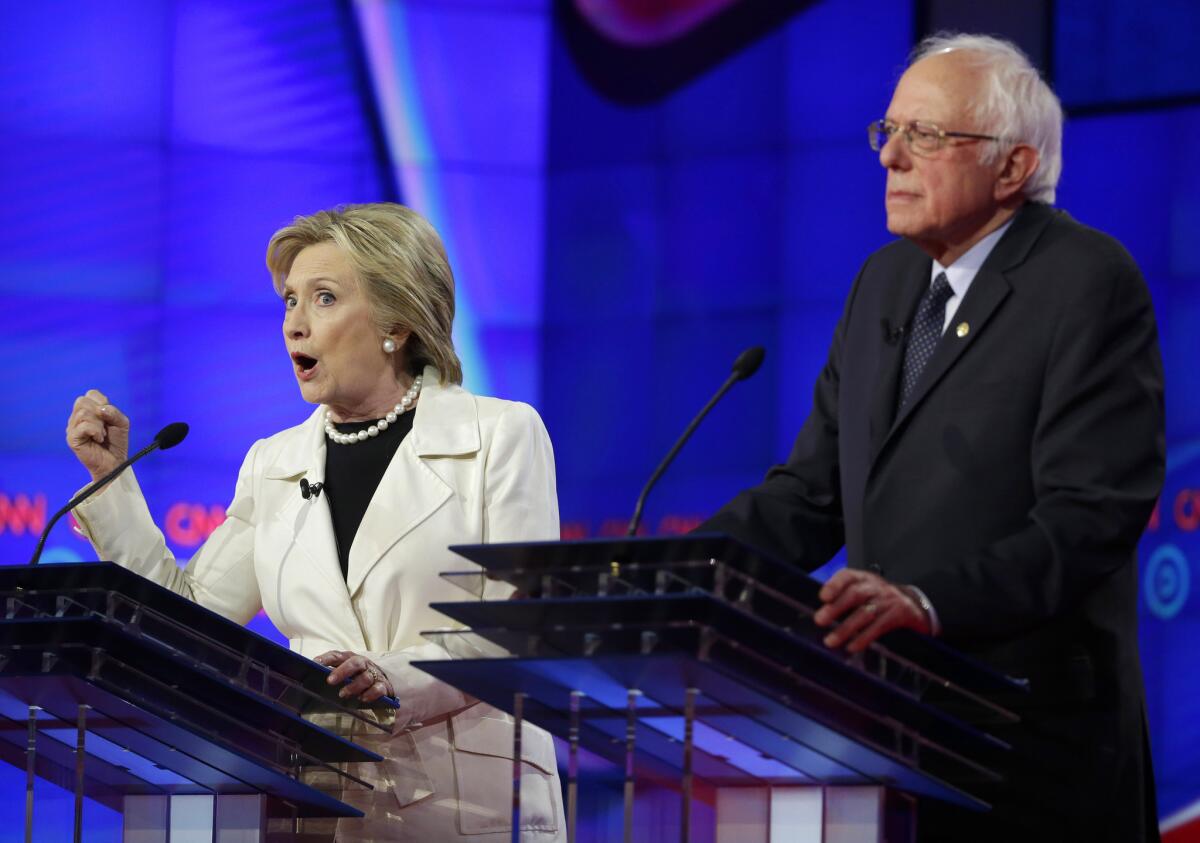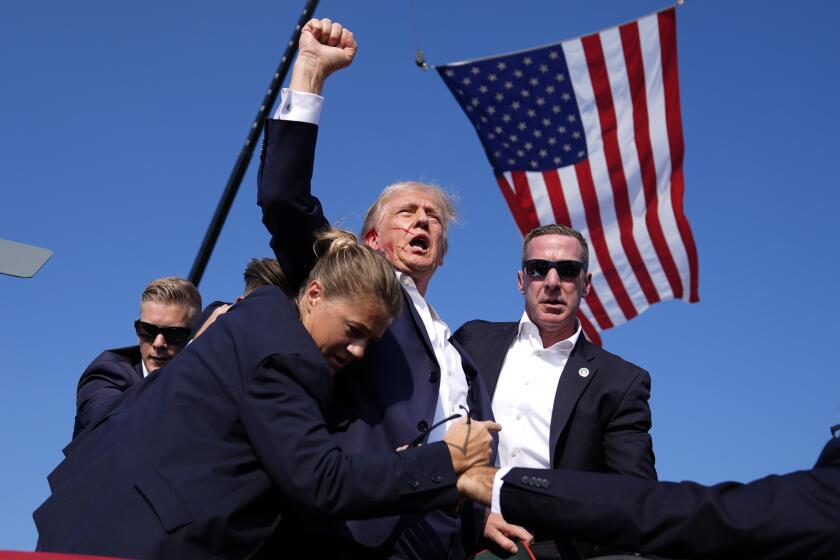Analysis:: In brawling Brooklyn debate, Clinton and Sanders define big differences

Hillary Clinton speaks while Sen. Bernie Sanders listens during a Democratic presidential debate Thursday night in Brooklyn.
Reporting from New York — For two hours on Thursday, the Democratic candidates in their debate came close to behaving as the Republicans have all year: They flared in anger and rudely dismissed each other’s positions.
Yet beyond the heated rhetoric, Hillary Clinton and Bernie Sanders also illuminated the divergent paths they are taking to what would be vastly different presidencies.
Clinton can, and does, summon an immense repository of detail, which she wields to great effect except when she is trying to avoid being pinned down, a tactic she used at times Thursday to her own detriment. Sanders applies a broad brush, raising many issues he deems all-important but explaining so little about his solutions that he casts doubt not just on his odds of success, but on his seriousness.
Election 2016 | Live coverage on Trail Guide | Track the delegate race | Sign up for the newsletter
From a purely political perspective, some of Sanders’ sweeping declarations opened him up to risk in Tuesday’s New York primary.
The Vermont senator dismissed Clinton’s victories in the “deep South,” without acknowledging that her votes in those states came heavily from one of the most loyal of Democratic party blocs, African American voters. He also indicated he would back away from U.S. support of Israel, saying that “we cannot continue to be one-sided” and pressing for more consideration for Palestinians.
The danger: Together, black and Jewish voters likely will make up at least one-third of Democratic voters expected to cast ballots Tuesday.
Clinton, meantime, fumbled a few issues — weaving around whether she would raise Social Security taxes on the wealthy and outlining a confusing position on the minimum wage. But over and over again, she moved the discussion specifically to the voters of New York, her most important audience.
In her opening remarks, she brought up the 9/11 first responders; before the debate was over, she had prominently mentioned Brooklyn, Syracuse, Gov. Andrew Cuomo and New York City’s culture and diversity. She also repeatedly embraced President Obama and chastised Sanders for not avidly supporting him — even as she blamed the president for any negative fallout from actions in Libya that she had supported as secretary of State.
Two telling exchanges came as the candidates disagreed over gun control and climate change, recurrent issues this primary season. One is a subject on which the two actually differ in substance; the other features a disagreement primarily of tactics and rhetoric.
The dispute over gun control involved the rare issue in which Sanders’ record is more conservative than Clinton’s — or most Democrats.
The topic could have been a negative for Clinton, as it centered on the accuracy of a questionable pitch in which her campaign blamed the lax firearms laws of Sanders’ bucolic home state for some of the gun violence in New York City.
“Are you seriously blaming Vermont?” moderator and CNN anchor Wolf Blitzer asked, prompting laughter from Sanders. Clinton grew visibly angry, showing a sort of emotion she rarely displays in public.
“It’s not a laughing matter,” Clinton said. “Ninety people on average a day are killed or commit suicide or die in accidents from guns, 33,000 people a year. I take it really seriously, because I have spent more time than I care to remember being with people who have lost their loved ones... We need a president who will stand up against the gun lobby. We need a president who will fight for common sense gun safety reforms.”
She went on to criticize Sanders for voting against several Democratic gun control measures and for backing a law that gave gun dealers and manufacturers immunity from many lawsuits, which she called “an absolute abdication of responsibility.”
The immunity law is an emotional and a current one in New York because it may limit the ability of relatives to take to court the manufacturer of the weapon used to kill 26 children and adults in a Newtown, Conn., school in 2012. The family members from the next-door state have pressed their case in court and in public this week, with some demanding Sanders apologize for his opposition to their suit. (He declined to do so Thursday night.)
“We hear a lot from Sen. Sanders about the greed and recklessness of Wall Street,” she said. “Well, what about the greed and recklessness of gun manufacturers and dealers in America?”
A later exchange over climate change demonstrated how, even when they hold similar positions, the two candidates adopt different approaches. Sanders described the problem — “We have an enemy out there, and that enemy is going to cause drought and floods and extreme weather disturbances” — but not a solution other than to say his proposal contained a carbon tax.
Clinton returned with a detailed description of how she and Obama had worked to craft an international climate agreement involving 195 countries, and she criticized Sanders for suggesting that the landmark deal was insufficient.
Sanders contrasted his bold instincts with Clinton’s more cautious approach.
“This is a difference between understanding that we have a crisis of historical consequence here, and incrementalism and those little steps are not enough,” he said.
“I don’t take a back seat to your legislation that you’ve introduced that you haven’t been able to get passed,” Clinton replied, making the first of several intimations that Sanders is better at naming problems than finding solutions. “I want to do what we can do to actually make progress in dealing with the crisis.”
The Thursday debate loomed as Sanders’ biggest opportunity to derail Clinton in a state where she served as a senator for eight years — as she repeatedly reminded viewers — and where she has held a fairly steady lead heading toward Tuesday’s vote.
Knocking Clinton off stride here has been a tall order for Sanders, even as he has demonstrated strong appeal to liberal and young voters this year. New York voters know Clinton, for better or worse, and there’s little new that he can offer to alter their view.
To cut dramatically into her advantages would require a depth of detail that Sanders rarely offers. It has been an article of faith for Sanders, for example, that Clinton’s campaign donations from Wall Street employees and her receipt of hundreds of thousands of dollars in speaking fees from companies like Goldman Sachs amount to pay-offs for her political stances.
Asked repeatedly Thursday whether he could name a single move she made as senator that indicated Clinton was under the sway of Wall Street, Sanders did not answer, instead reciting his familiar condemnation of those firms as “fraudulent operators” that must be broken up.
“He cannot come up with any example, because there is no example,” Clinton retorted.
Sanders also had no answer when asked why he would allow what he considers illegal enterprises to decide themselves how to break apart. He said only that he did not know that it is “appropriate” for the Treasury Department to make that call.
The New York campaign has been notable for harsh conflicts between the candidates over specific policies and over which of them has the qualifications and judgment necessary to be president. The two hours of occasionally nasty bickering in Brooklyn left voters with the options they have had all along: two candidates with obvious elements of appeal and, just as obviously, vulnerabilities.
No knock-out punch was delivered Thursday, and Tuesday’s voting is not likely to deliver one either. The race will go on, all the way to the final voting in June. Then Democrats, having settled on a nominee, will have to turn to reuniting two wings of a party that has grown more divided as the long election season has moved on.
Follow me on Twitter: @cathleendecker. For more on politics, go to latimes.com/decker.
ALSO:
Hillary Clinton fights for black voters in New York amid racially-inflected stumbles
In New York, presidential candidates are alone in their comfortable bubbles
Live coverage from the campaign trail
More to Read
Get the L.A. Times Politics newsletter
Deeply reported insights into legislation, politics and policy from Sacramento, Washington and beyond. In your inbox three times per week.
You may occasionally receive promotional content from the Los Angeles Times.











